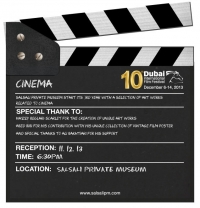10 YEARS DUBAI FILM FESTIVAL
&
2 YEARS SALSALI PRIVATE MUSEUM!
SALSALI PRIVATE MUSEUM WILL START ITS 3RD YEAR WITH THE SHOW,
CINEMA!
Salsali Private Museum (SPM) celebrated its second anniversary in 2012 with ‘RPM’, an acclaimed show featuring vintage posters and the graphic design of Iranian cinema soundtracks from the 1960s to 1970s accompanied by a book launch.
In NOV 2013, SPM commemorates its third year with a tribute to the simultaneous tenth anniversary of the Dubai International Film Festival. ‘Cinema’ is a group show that takes the world of the movies as its central theme and presents a selection from the collection of Ramin Salsali, who was appointed as Patron of the Arts for the fourth consecutive year by His Highness Sheikh Mohammed Bin Rashid Al Maktoum, UAE Vice President, Prime Minister and Ruler of Dubai.
Artists works such as:
Nazzy Beglari – Scarlet
Terry O’Neil
Michel Hadi
Manal Al Dowayan Kamran Diba Youssef Nabil
Sueraya Shaheen Ando Hiro
Nemai Gosh
Samira Alikanzadeh Emran Nafiseh
Heitor Cortesao Gil
Niyaz Azadikhah
Tarek Al Ghouseein
Patrick Demarchelier Ayman Yossri
will be showcased.
Forming the central axis of the show are new works from Abu Dhabi-New York based artist and prize-winning correspondent Nazzy Beglari-Scarlet’s ‘Clean Cinema’ series. Nazzy converted her energies and experiences to creating provocative and amusing Art works, such as those featured in this show. In addition, her ‘wearable art’ designs will be premiering at November’s Abu Dhabi Art, having been spotted recently being worn by Shirin Neshat, Isabella Rossellini, Youssra, and Golshifteh Farahani at the recent Abu Dhabi Film Festival.
Over the past two decades, Nazzy Beglari-Scarlet’s journalistic travels have taken her repeatedly to Egypt. It was during one of these visits, whilst interviewing Egyptian star Youssra, that she heard for the first time the phrase, ‘clean cinema’ (in Arabic, ‘as-sinima an-nazifa’). This led to Beglari-Scarlet mulling over the concept.
The movies made in the 1950s, 1960s and 1970s during the Golden Age of Egyptian Cinema, in Lebanon and in Iran that were once widely shown in the cinemas and on the TV, are no longer broadcast. But many still watch them on video in their privacy of their homes. As a character famously remarks in Molière’s “Tartuffe,” written in France back in the 17th Century, “If it happens behind closed doors, it’s not a sin”.
But is it “clean”? What is “clean”? What is clean cinema? Moreover, who decides what is clean? Both the established and neo-radicals use these terms to refer to art and films which falls outside of their narrow ideological parameters. Whether political expression, incitements to protest, cultural dissonances or even the simple depiction of interhuman emotion, artworks and films remain heavily contested in some countries across the Middle East.
Middle East is not only misunderstood by the west, but also by the neo-radicals!
After the 2011 revolution in Egypt, independent filmmakers like Osama Fawzi and Khaled Youssef, a former assistant of Youssef Chahine, welcomed the political change by making films that reveled in a new environment of freedom. But soon, a conservative and radical clique in parliament demanded that these films should be banned because of their ‘unclean’ content. Meanwhile, the cinemas in Tunis, which showed the innocent film “Persepolis” were being attacked, even before the first free elections in the country.
Taken with the notion of ‘Clean Cinema’ and all that the phrase connotes, Nazzy attempts to understand the concept and to challenge its apparent goal of banishing the portrayal of normal human displays of affection from art. It’s an exploration of how art can become a tool for radical groups to manipulate the public mind and to associate art with `sin`.
Nazzy has painstakingly created all of the images and props especially for the series - no Photoshopping! – and she has carefully crafted their mise-en-scène. The backdrops are mostly drawn from black-and-white images from the golden age of Egyptian cinema during the 1950s and 1960s, while the present is depicted in full color foregrounds, offering a humorous – and literal - take on ‘cleaning’ cinema -
‘Clean Cinema’ being as much her critique of the concept of cleaning cinema from ‘sin’, as it is about her love for Egyptian culture and cinema.
Salsali Private Museum would like to thank Abed Bibi for his contribution with his unique collection of vintage posters of classic Arab films demonstrating the long tradition of artistic expression in the region’s movies.
Ali Bakhtiari, the renowned Iranian curator and the author of the book, ‘RPM’, has supported this show with his selection of the posters of Iranian films. SPM thank Ali and all of the artists of this show.

